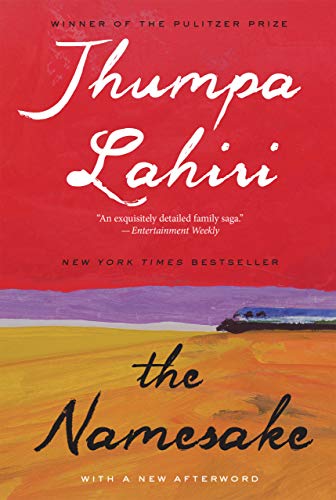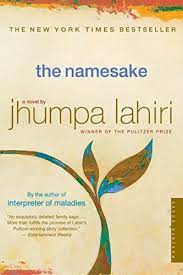
Introspection #4: Let Your Identity Roam
Introspection #4: Let Your Identity Roam
I love my name.
I love its awkward length. I love its significance (Jethro= abundance, Ronald= ruler). I love its uniqueness.
However, this is not the case for Gogol Ganguli, the protagonist of Jhumpa Lahiri’s The Namesake. Her book highlights Gogol’s struggles in defining his identity amidst his Bengali-style upbringing and American surroundings. This inner tension prevails throughout the entire novel, and the way that Lahiri illustrates Gogol’s journey with his identity is captivating and enlightening.

The book begins by focusing on Gogol’s parents, Ashoke and Ashima Ganguli, and how their lives changed the moment they stepped into Boston, Massachusetts. When Ashima had her firstborn child, the Gangulis wanted to follow a Bengali custom in which the name of their child would be determined by Ashima’s grandmother overseas. The book takes place vastly before our modern digital era, hence, the Gangulis expected that Ashima’s grandmother would send them a letter revealing the would-be-name of their firstborn child, which could take months to arrive.
However, the Gangulis are faced with the unfortunate reality that America’s policies make it so that their baby would have to be named as soon as possible, definitely not in a few months. With the unexpected pressure of allotting their child a worthy name, Ashoke makes the rash decision to name their newborn child “Gogol” after the author Nikolai Gogol, one of Ashoke’s favorite novelists. Despite the legal name of their child already accomplished, the Gangulis assure each other that “Gogol” would just be the “pet” name of their child, not to be used in formal situations. The child’s “good” name, or more formal name, would be the name that appears on the highly anticipated letter from Ashima’s grandmother.
The birth of Gogol represents a transition in the Ganguli family, from a long line of Bengali descendants to their first-generation American. Hence, Ashima and Ashoke are the first of their families to confront the conflicts between Bengali culture and American culture through both their own experiences and those of their child.
Long story short, Ashima’s grandmother’s letter gets lost, and Ashoke and Ashima decide to deem Gogol’s “good” name themselves: “Nikhil.” As his “good” name, Ashima and Ashoke explain to Gogol’s elementary school principal upon Gogol’s matriculation that he should be addressed as “Nikhil” in school, rather than Gogol. It is at this moment in which Gogol’s views on his identity start to differentiate from his parent’s. As a naive toddler, Gogol accepted his parents’ Bengali ways: attending Bengali concerts, eating Bengali food, having parties with only other Bengalis, etc. But when forced with a Bengali name that he felt no connection with, Gogol becomes discontent with his parents’ decision. He refuses to be called “Nikhil”, secretly telling the school principal that he would prefer to be called “Gogol” instead, which is something that the principal accepts.
Henceforth, the book illustrates the increasing tension between the identity that Gogol wants to self-proclaim and the identity that his parents want him to have. Fearful that their Bengali traditions will diminish in America, Gogol’s parents push a Bengali way of life onto Gogol. Yet, Gogol eventually realizes as a maturing young adult that he personally does not identify himself as a Bengali. Thus, he starts to break away from his parents, and hence break away from his Bengali background as well. Wanting to physically and spiritually distance himself from his parents, Gogol pursues an education at Columbia University in New York rather than MIT, which is much closer to his parents in Boston. He also chooses to legally change his name from “Gogol” to “Nikhil,” despite that he wanted otherwise in pre-school, after later realizing that he hates that his father named him after Nikolai Gogol, a writer who is known for having an unfortunate and pitiful life. This transition depicts his evolving desire to carve his own identity without his parents’ influence.
Gogol’s stubbornness with his Bengali roots fascinated me, for personally, I strive to connect, not disconnect, with my parents’ Filipino culture. Despite being a first-generation American myself, unlike Gogol’s parents, mine actually encouraged me to Americanize, rather than cherish their Filipino traditions. My parents forced me away from Tagalog to learn English, and now I am attempting to re-learn Tagalog through various resources. Furthermore, my dad pushed me to try more “American” activities as I grew up, from joining a baseball team to watching the Super Bowl every year. Like Gogol, I naively obeyed my parents’ demands as a toddler. Now, however, I have no interest in football or baseball. For the Super Bowl this year, as my dad’s eyes were glued to the screen over whether or not Tom Brady would disappoint or triumph, I comfortably isolated myself in my room, diligently working on a presentation for a research competition.
I think that the difference between Gogol’s experiences and those of mine stem from how our parents perceive American culture. My parents view America as a land of opportunity, one in which their dreams can become reality due to its freedom-embracing culture. Gogol’s parents, however, viewed America as a land of danger, in which their values would be challenged and prone to harm. Hence, my parents adapted to America much more smoothly than Gogol’s, which is probably why my parents encouraged me to have an admirable perspective of America, rather than a hateful one like Gogol’s.
But Gogol is determined that his life is not carved by his parents. Thus, he attempts to hide from them as much as possible. He even ignores their letters and calls for months as he spends time with a girlfriend who encourages him to live a life of independence, rather than one of accommodation.
However, everything changes for Gogol once his father dies due to a surprise heart attack. Realizing how much precious time he could have spent with his father was spent on escaping from him instead, Gogol now passes more time with his mother, and in doing so, tries to connect with her Bengali roots as well. This effort leads Gogol to marry a Bengali girl named Moushumi, who shares Gogol’s struggle of unchaining herself from her parents’ values and establishing her own. This struggle motivated Moushimi to major in French, a language that is both not Bengali and not English, to remove herself from the Bengali culture her parents have and the American culture her parents brought her to. She even temporarily moved to Paris to ensure that she could grow to identify herself with a culture on her own, without others distracting her from her pursuit.
At the end of the novel, Moushumi, discontent with herself for meeting her parents’ expectations of marrying a Bengali man, along with other factors, causes Moushimi to cheat on her husband with another man. When Gogol realizes that Moushimi has been secretly having affairs, he and his wife divorce. However, with independence being reintroduced into his life, Gogol no longer wants to spiritually split himself from his parents.
He is still struggling to define his identity, but he now appreciates why his parents tried to force so many Bengali customs onto him. The fear of losing their traditions in America reflects Gogol’s new fear of losing connections with his parents after his father’s death. Having experienced his physical loss, Gogol tries to emotionally reconnect with his father through a book that his father gifted him long ago: a book of short stories by none other than Nikolai Gogol himself, the man who inspired his name.
His mother, summoning a new sense of strength after her husband’s death, is no longer fearful of her new American life. Instead, she embraces it. She now accepts that she can no longer address her fears of America by loathing its distinct culture. America, she recognizes, has been nothing but welcoming to her, so Ashima now willingly designates the country as her home. Thus, declaring herself as American, she exchanges her Bengali passport for a more fitting American one.
Lahiri enforces that your identity will change through the experiences you encounter. Throughout this ongoing journey, some aspects of your identity will be out of your control. But instead of trying to fight those aspects, Lahiri encourages us to find comfort in those aspects and unearth ways to be proud of yielding them. For Gogol, he learned that he can never flee from his parents’ influence, so instead, he tries to accept it in his mission to proclaim an identity of his own. For Ashima, she learned that fighting against the fear that her new home would drain her identity, rather than enhance it, was not worth the misery.
I will always be Filipino-American. Even if there are parts of America that I do not identify with, particularly its unjust treatment towards its minorities, America will always be a part of me. I am definitely not the image of a typical “American.” And I do not think that I ever will be. I do not decorate my house red, white, and blue during the 4th of July, nor do I engage in any “American” sports (or any sport at all, to be truthful).
But over time, as I build an identity for myself, I find that I can embrace being American through the American values that I do align with. Freedom. Opportunity. Justice. I assure myself that even though I do not have to be proud of being American, I can still be proud of being a moral citizen. Hence, America has never defined me. Instead, it guides me.
And Lahiri makes clear that it will continue to guide me forever.
I must accept that.
